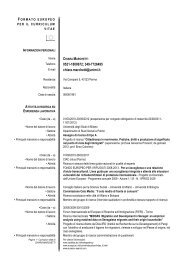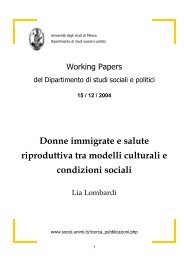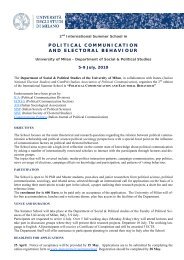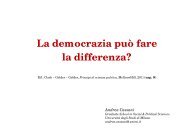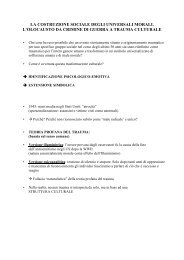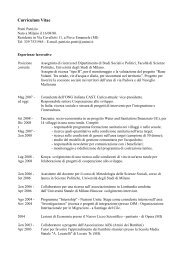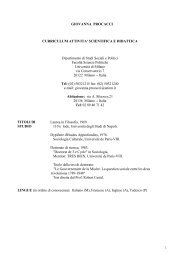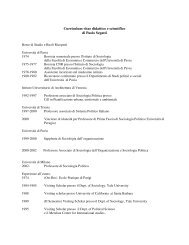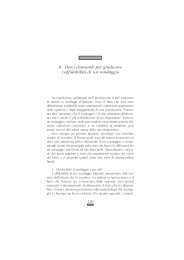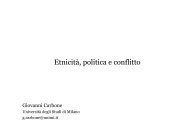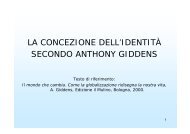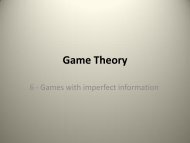The european dimension of political discourse in Italy. A ... - CIRCaP
The european dimension of political discourse in Italy. A ... - CIRCaP
The european dimension of political discourse in Italy. A ... - CIRCaP
Create successful ePaper yourself
Turn your PDF publications into a flip-book with our unique Google optimized e-Paper software.
THE EUROPEAN DIMENSION OF POLITICAL DISCOURSE IN ITALY.<br />
sometimes prov<strong>in</strong>g rather silent on the problem <strong>of</strong> the role <strong>of</strong> a more <strong>in</strong>tegrated Europe <strong>in</strong> the<br />
<strong>in</strong>ternational order (table 3). Although most <strong>of</strong> the documents have been considered on the<br />
whole as oriented to Identity Europeanism, the process <strong>of</strong> European <strong>in</strong>tegration was <strong>of</strong>ten<br />
represented as a domestic convenience, prov<strong>in</strong>g beneficial for the modernization <strong>of</strong> the<br />
country, and for this reason further <strong>in</strong>tegration was claimed. <strong>The</strong> impact <strong>of</strong> <strong>in</strong>tra-party<br />
tensions on the <strong>political</strong> <strong>discourse</strong> <strong>of</strong> the Dc made the question <strong>of</strong> the <strong>in</strong>ternational role <strong>of</strong><br />
Europe somehow problematic, and for this reason EEC was <strong>of</strong>ten represented simply as a<br />
matter <strong>of</strong> defence <strong>of</strong> domestic <strong>in</strong>terests. By the end <strong>of</strong> the decade the party was silent on this<br />
problem and the level <strong>of</strong> commitment <strong>of</strong> its <strong>political</strong> <strong>discourse</strong> to European <strong>in</strong>tegration was<br />
rather low <strong>in</strong> all its aspects. Some h<strong>in</strong>ts <strong>of</strong> this general “defensive” <strong>discourse</strong>s follow:<br />
If Euratom is an advantage for Europe, it is even more so for <strong>Italy</strong>, a country poor <strong>in</strong> natural<br />
resources. <strong>The</strong> Dc, aware <strong>of</strong> the benefits that Euratom can br<strong>in</strong>g to <strong>Italy</strong>, not only gave its<br />
unconditional support to the treaty, but led as well an action whose aim was to build the largest<br />
majority possible support<strong>in</strong>g the treaty...<br />
...the Western world, thanks to the Atlantic treaty, the WEU and to the first steps towards a<br />
European Union, shows the need <strong>of</strong> an ever deeper <strong>in</strong>tegration among similar nations, <strong>in</strong> order to<br />
defend their own existence and future 10 .<br />
In the sixties, party attitudes towards European <strong>in</strong>tegration were more cohesive, even if no<br />
unanimity can still be found, at least until the middle <strong>of</strong> the decade. More and more European<br />
<strong>in</strong>tegration was seen <strong>in</strong> terms <strong>of</strong> domestic ga<strong>in</strong>s, there was not much reference to the<br />
potential mission <strong>of</strong> the European entity <strong>in</strong> the world order. European <strong>in</strong>tegration was still<br />
represented as serv<strong>in</strong>g goals <strong>of</strong> modernization, economic expansion and, <strong>in</strong> the Italian case,<br />
<strong>of</strong> country-legitimisation <strong>in</strong> the <strong>in</strong>ternational arena, where <strong>Italy</strong> would otherwise be a marg<strong>in</strong>al<br />
actor given its status <strong>of</strong> middle-range power and looser <strong>in</strong> the WWII. <strong>The</strong> Dc supported any<br />
measure oriented to more economic and <strong>political</strong> <strong>in</strong>tegration. First <strong>of</strong> all, the Common Market<br />
was acknowledged as a mechanism for domestic modernization and for the solution <strong>of</strong><br />
endemic domestic problems. In the sixties, the party already showed a vision <strong>of</strong> European<br />
<strong>in</strong>tegration as a solution to <strong>in</strong>adequacies <strong>of</strong> the domestic system, and economic and <strong>political</strong><br />
constra<strong>in</strong>ts com<strong>in</strong>g from Europe were expected to overcome the endogenous weakness <strong>of</strong><br />
<strong>Italy</strong> com<strong>in</strong>g from a highly polarised and fragmented <strong>political</strong> system, <strong>in</strong>stitutional <strong>in</strong>efficiency<br />
and domestic <strong>in</strong>terests hostile to reforms. Moreover, the party felt that a united democratic<br />
Europe would conta<strong>in</strong> the domestic communist threat.<br />
9 Some <strong>of</strong> the DC members writ<strong>in</strong>g <strong>in</strong> Prospettive founded later Stato Democratico, a review that<br />
played an important role <strong>in</strong> promot<strong>in</strong>g the <strong>political</strong> alliance with the Socialist party.<br />
10 Excerpt from Cento Argomenti. Orientiamo gli elettori, programmatic platform <strong>of</strong> the Dc (1958).<br />
15



